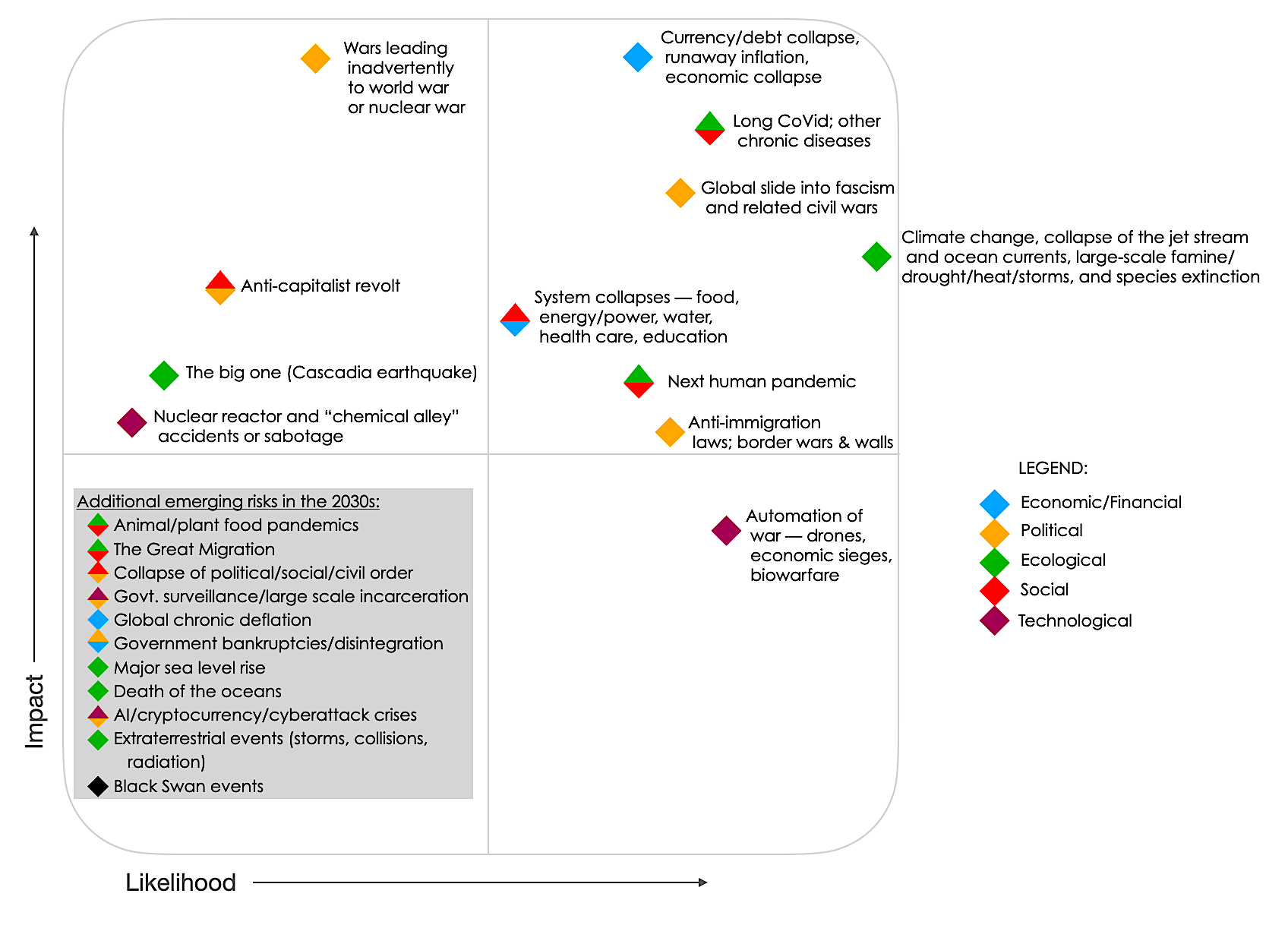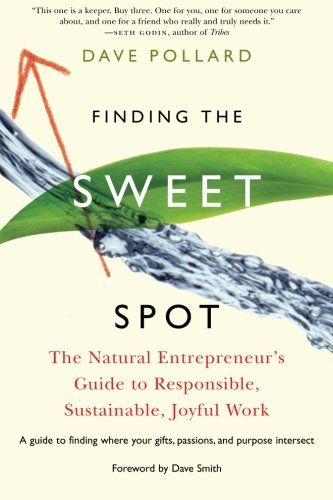More Risky Business

In recent years, I’ve made fun of the extravagant annual Davos self-congratulatory business ego-fest, and in particular the annual survey of their expert gnomes on the biggest global risks to business. Their fad-happy, bumbling risk predictions reached an all-time low two years ago when, just three months before the first huge wave of CoVid-19, these ‘experts’ ranked ‘spread of infectious disease’ dead last of 30 types of risk.
Before CoVid-19, the expert gnomes were asked to assess risks in two dimensions – probability (%) of the risk occurring in a particular time horizon, and impact ($) if it did occur. This is the classical risk model, but it appears it was just too confusing for the gnomes, and now they’re just being asked to rank the ‘overall’ risk, I suppose qualitatively weighing the two factors.
This year’s assessments are, if anything, even worse than prior years. It appears they do not follow current events or read history beyond their native countries, since, despite the doomsday clock readings, the risk of global or nuclear war was nowhere to be found in their rankings. What ranked first, as the highest ‘risk’ for the next decade, was — get ready to groan — “climate action failure”. Apparently, they don’t appreciate that this prediction is about as bold as predicting February will follow January. A certainty is not a “risk factor”, unless, I suppose, one is drinking the Davos Kool-aid. This “risk” has intermittently appeared on and disappeared from their lists for decades, depending on, apparently, who this year’s special guest speakers at Davos are.
Their second and third greatest “risks” — extreme weather and biodiversity loss — are corollaries and consequences of the first, though since they are treated as simply costs of doing business (much of the risk report is, after all, about “economic recovery” and “growth”), it’s hard to see their inclusion as major risks as anything more than virtue signaling. But, then, virtual signaling is one of the least expensive costs of doing business these days, and, supported with the right marketing, PR, misinformation, and celebrity endorsements, it makes for great business.
Enough grousing about Davos. Looking at the latest report, I got to thinking about what I would list as the greatest global risks for the rest of this decade, and what additional risks will probably have to be added to the list in the 2030s, which is starting to look like it may be the most challenging in our species’ short history.
These are not specifically “business” risks, though they are all very disruptive to “business as usual” – which is not necessarily a bad thing. My assessment is shown on the chart above. Here’s a brief walkthrough, in order from top to bottom:
Top risks for 2022-2030:
- Wars leading inadvertently to world war or nuclear war.
- Currency and debt collapse, precipitating runaway inflation and economic collapse — including stock, commodity, real estate market and trade collapse: We’re teetering again, and thanks to massive tax cuts for the rich, and staggering military spending, the coffers for bailouts are now empty.
- Long CoVid; other chronic diseases: The massive rise in debilitating chronic diseases born of the sickening diets and lack of exercise in western nations has already led to massive increases in health care costs, dramatically higher vulnerability to pandemic diseases, and plummeting labour participation rates. We ain’t seen nothing yet.
- Global slide into fascism and related civil wars: The overtly racist and misogynistic governments in Florida and Texas, Trumpist fascism, and xenophobic right-wing populism all over Europe, are signs of a growing intolerance for any kind of democratic governance and regulation. These are the signs of looming political and social collapse.
- Climate change, the collapse of the jet stream and ocean currents, large-scale famine/drought/heat/storms, and species extinction — and their accelerating effect on the livability of much of the planet: This is a certainty, but it won’t reach its full intensity for another decade or two.
- Anti-capitalist revolt: The excesses of untrammeled ideological capitalism have largely wrecked our financial and economic systems, creating monstrous inequality, ubiquitous corruption, and rendered our political and social systems largely dysfunctional. The question is whether there will be enough collective willpower to end this failed experiment and introduce a viable, functional, mixed, and truly democratic economy and politics, and, even if it fails, how disruptive the attempt to do so will be.
- The system collapses — food, energy/power, water, health care, education: These systems are already staggeringly fragile, underfunded, overextended, and dependent on horrifically obsolete infrastructure at the end of useful life. These collapses will happen in tandem with economic collapse.
- The next human pandemic: If it’s an HxNx virus like the 1918 pandemic, which epidemiologists think most likely, it will hit the 20-50 healthy age group hardest (due to a cytokine storm immune system overreaction), and will gut the global workforce of its most essential workers.
- Anti-immigration laws; border wars (and walls). All over the world, the pressure is building, and even many progressives want more restrictions. This is going to be massively ugly.
- The big one (at least in my part of the world): A long-overdue major Cascadia earthquake would kill millions, leave tens of millions homeless, bankrupt the insurance industry, and shut down much of the west coast of North America to trade, possibly for decades.
- Nuclear reactor and “chemical alley” accidents or sabotage: There’s a long litany of these, and so far we’ve been lucky.
- The automation of war — drones, economic sieges, biowarfare: Like with the nuclear bomb, we have no idea of the horrifying potential of new forms of tech-driven warfare that we’re just starting to explore.
Additional risks for 2030-2040:
- Animal/plant food pandemics: Pandemics affect not only human health directly, but can also affect the health and availability of crops and other foods we eat. The scourge of factory farming is going to make this a continuing high risk until this scourge is eliminated. Monoculture agriculture adds to the system’s fragility and risk and further depletes the quality and essential variety of the foods we eat.
- The Great Migration: I’m sticking with my estimate of two billion climate refugees, the same proportion of the planet’s human citizens that migrated long distances during the latest ice ages. This will change everything.
- Collapse of political/social/civil order: With irreversible economic collapse nearly complete, and widespread political upheaval, the giant question is whether the mass of humanity, in the face of cascading crises, will find social strength in it, as most did during the Great Depression, or whether our social fabric will tear along with the rest of our systems.
- Govt. surveillance/large scale incarceration: To what extent, as the systems of civilization start to collapse, will governments and powerful corporate feudal mega-corporations attempt to suppress widespread citizen outrage and upheaval using surveillance and police/military might, versus just bailing out and retreating to their mansions in New Zealand? Probably a mix of the two.
- Global chronic deflation: A paradox of economic collapse is that hyperinflation can be followed by chronic deflation, as purchases of everything non-essential dry up when buyers stubbornly hold out for even lower prices, to the point producers can no longer afford to make anything. Japan shows us how easily this can happen.
- Government bankruptcies/disintegration: With economic collapse, if no one is working then no one is paying taxes, so the government cannot afford to pay for any programs or even repay its debts. And who’s going to bail them out?
- Major sea level rise: This will take longer than we think, but with the number of people living at or below sea level, it won’t take much.
- Death of the oceans: The web of life on earth is inextricably connected to the life of our oceans, which are choking to death.
- AI/cryptocurrency/cyberattack crises: As fashionable as these subjects are, my sense is that with economic collapse, opportunities for high-tech adventurism will go the way of the internet before they become that spectacular.
- Extraterrestrial events (storms, collisions, radiation): A wild card, always. Probably not the Hollywood comet; more likely a massive radiation storm from an exploding super-nova, like the one that reduced human population to a few thousand about three million years ago.
- Black Swan events: Your guess is as good as mine.

Finding the Sweet Spot: the natural entrepreneur's guide to responsible, sustainable, joyful work
"Now what am I going to do?" is a question many people ask—and leave unanswered—at critical potential turning points in their careers. Perhaps you’re a new graduate, but instead of lining up for a boring entry-level job at a big corporation, you wish you could start your own sustainable and responsible business






